In the rich tapestry of Hindu mythology, Dhanvantari emerges as a significant figure, revered as the physician of the gods and the bearer of the elixir of life. As the divine healer, Dhanvantari holds a special place “Divine Healer” in the hearts of millions who seek health and well-being. Let’s explore the origins, significance, and stories associated with Dhanvantari in this article.
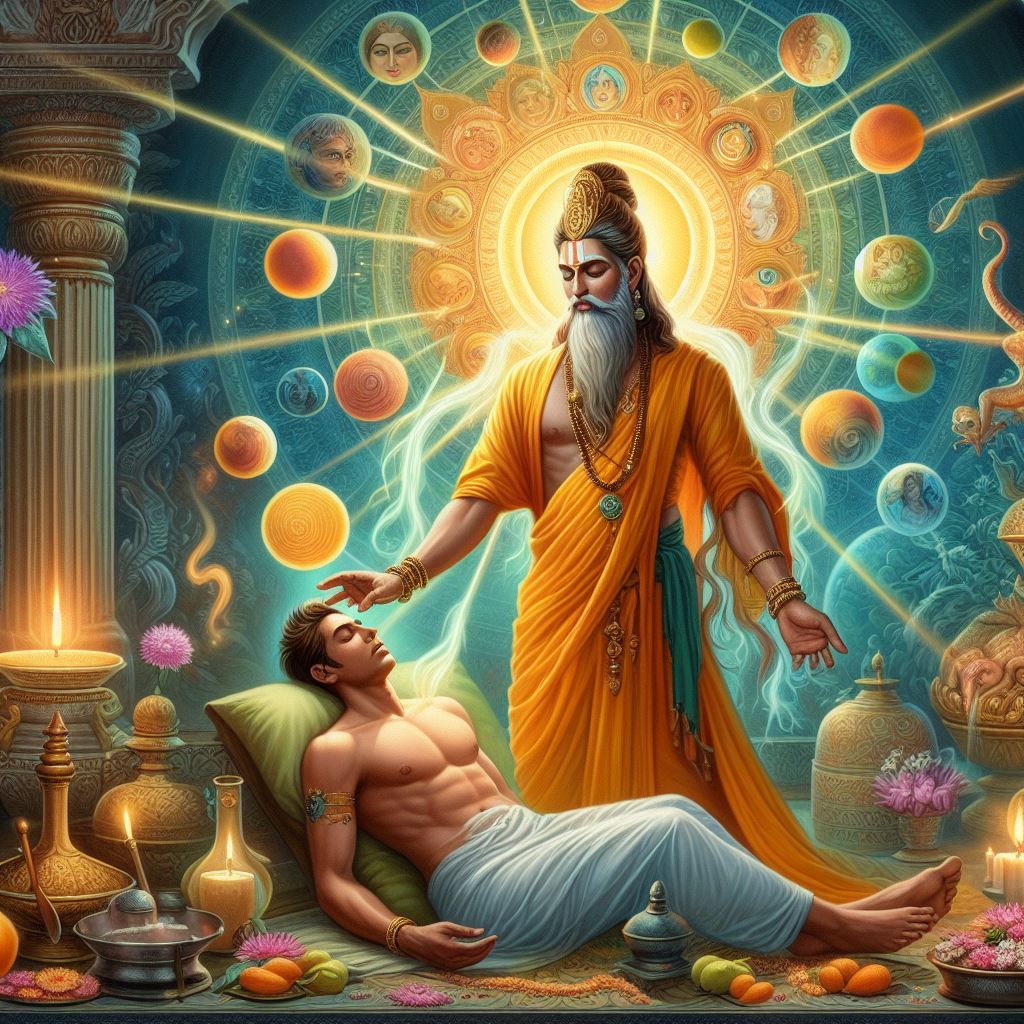
The Origins of Dhanvantari:
Dhanvantari finds his roots in Hindu scriptures, primarily in the Puranas, where he is often depicted as an incarnation of Lord Vishnu. According to one popular narrative, during the churning of the ocean (Samudra Manthan) by the gods (Devas) and demons (Asuras) to obtain the nectar of immortality (amrita), Dhanvantari emerged holding a pot of ambrosia. This divine elixir was said to have the power to heal and grant immortality. Dhanvantari, a revered figure in Hindu mythology, traces his origins to the sacred texts, particularly the Puranas. Within these ancient scriptures, Dhanvantari is depicted as an incarnation of Lord Vishnu, one of the principal deities in Hinduism. The story of Dhanvantari’s origin is intricately woven into the narrative of the churning of the ocean, known as Samudra Manthan.
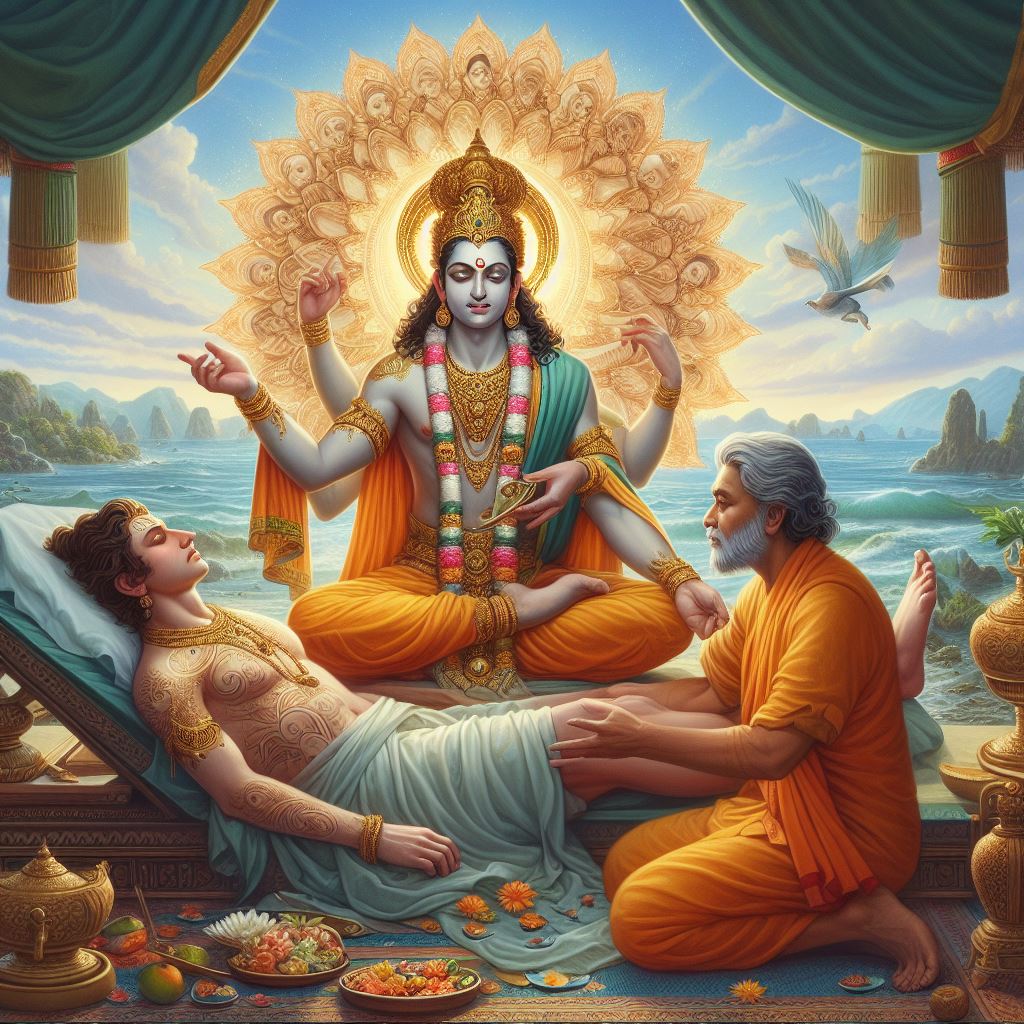
The tale unfolds during a cosmic battle between the Devas (gods) and the Asuras (demons), both seeking the coveted nectar of immortality, known as amrita. Mount Mandara serves as the churning rod, and Vasuki, the serpent king, becomes the churning rope. As the gods and demons engage in this arduous endeavor, various divine and mystical entities emerge from the churning ocean.It is amidst this celestial spectacle that Dhanvantari makes his grand appearance. Rising from the ocean, he holds in his hands a pot (kalasha) containing the elixir of life, symbolizing health and immortality. This divine nectar, believed to possess unparalleled healing properties, positions Dhanvantari (Divine healer) as the embodiment of the ultimate physician and the source of well-being for all beings.
Significance in Hindu Tradition:
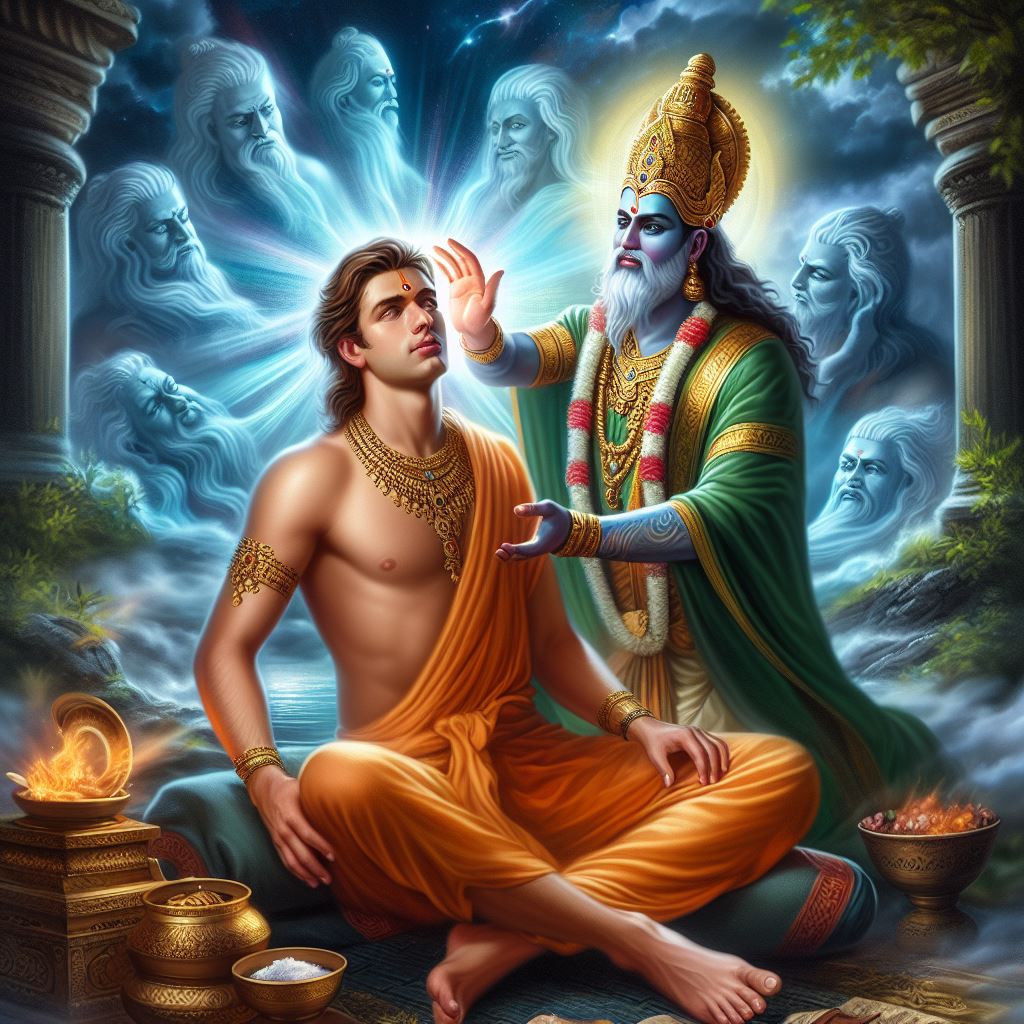
Dhanvantari is not merely a mythical figure but also a symbol of health, healing, and Divine healer the traditional Indian system of medicine – Ayurveda. In Hindu tradition, he is worshipped as the god of medicine and is considered the patron of physicians and surgeons. His presence is invoked during medical rituals and ceremonies to seek his blessings for the well-being of individuals and communities.
Iconography:
Dhanvantari is typically depicted as a handsome figure holding a pot (kalasha) filled with the nectar of immortality. In some representations, he carries the Ayurvedic texts and medicinal herbs in his other hands, symbolizing his association with the ancient healing system. The conch (shankha) and the discus (chakra) – attributes of Lord Vishnu – are also commonly associated with Dhanvantari, reinforcing his divine origin.
Celebrations and Festivals:
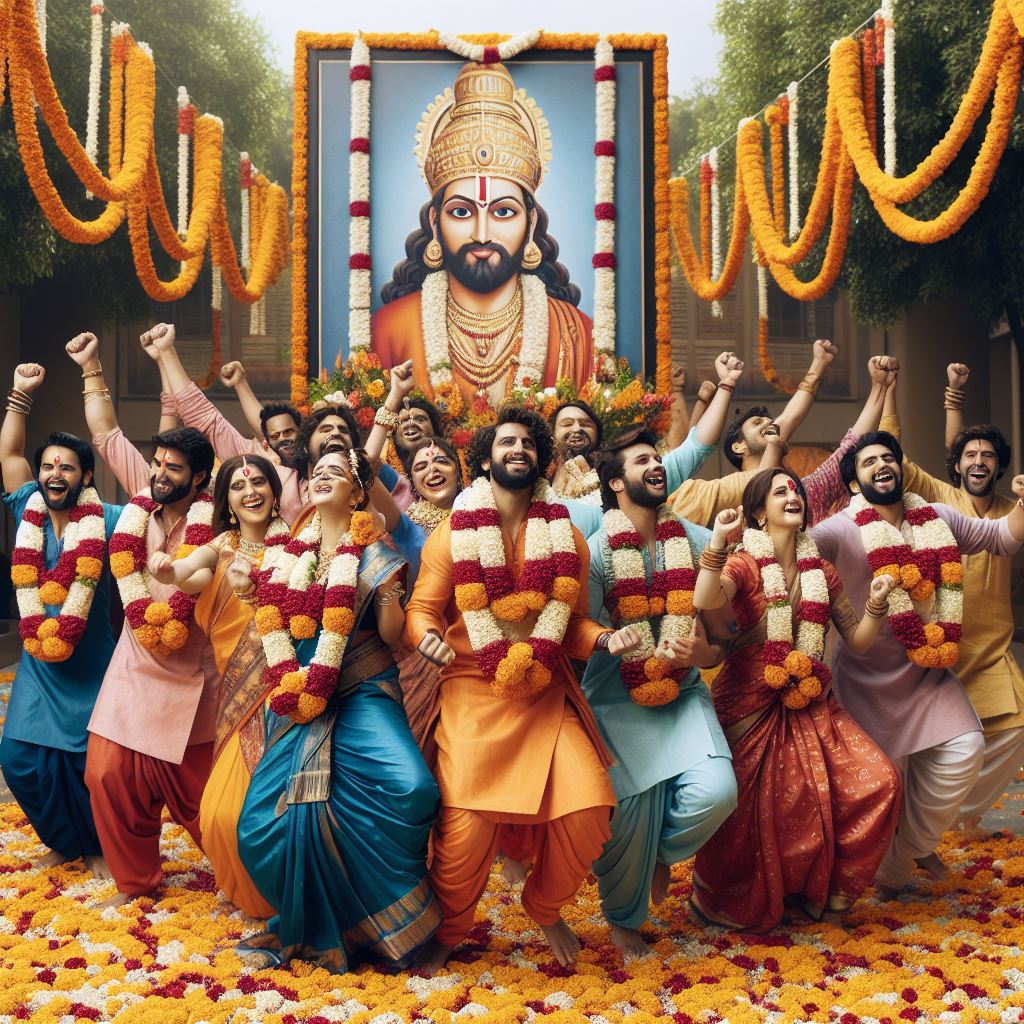
The festival of Dhanteras, which falls on the thirteenth day of the Krishna Paksha in the month of Ashwin, is dedicated to Dhanvantari. On this day, people pray for good health and prosperity, seeking the blessings of the divine healer. Ayurvedic practitioners, in particular, celebrate Dhanteras as a day to honor the wisdom of Ayurveda and express gratitude for the healing properties of medicinal plants.
Ayurveda and Dhanvantari:
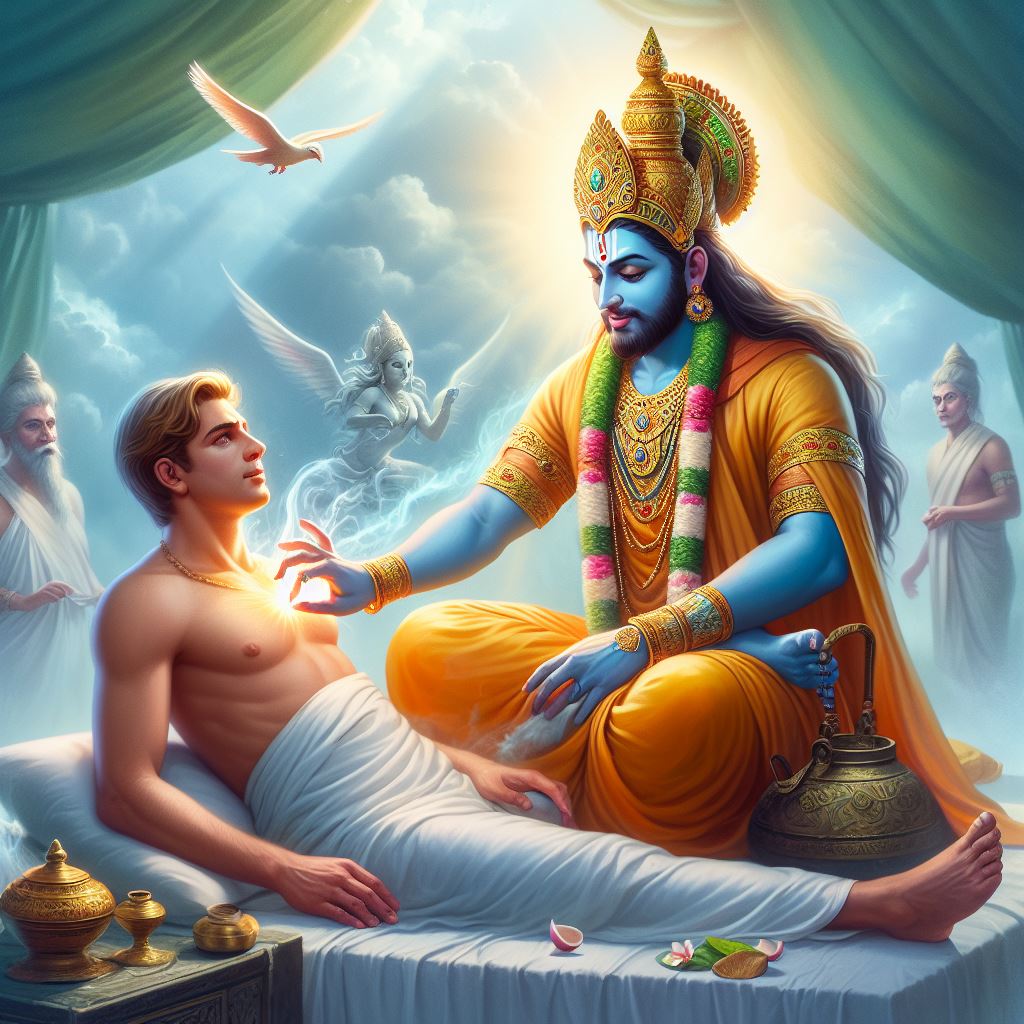
Dhanvantari’s connection with Ayurveda is profound, and he is often regarded as the embodiment of the knowledge and wisdom encapsulated in this ancient healing system. Ayurveda, a holistic approach to health, emphasizes the balance of mind, body, and spirit. Dhanvantari’s teachings are believed to have been passed down through the Ayurvedic texts, such as the Charaka Samhita and Sushruta Samhita, forming the foundation of traditional Indian medicine.
The Churning of the Ocean – Symbolism:
The episode of the churning of the ocean holds profound symbolic significance in Hindu mythology. It represents the eternal struggle between the forces of good and evil, with the pursuit of immortality symbolizing the human quest for eternal well-being. Dhanvantari’s emergence during this cosmic event signifies the divine intervention in the healing process, offering a remedy for the ailments and sufferings of mortals.
Conclusion:
Dhanvantari, the divine healer in Hindu tradition, continues to be a source of inspiration and guidance for those seeking health and well-being. His association with Ayurveda underscores the importance of holistic healing, aligning the mind, body, and spirit. As we celebrate festivals like Dhanteras, let us not only seek his blessings but also reflect on the timeless wisdom of Ayurveda and its potential to lead us towards a healthier and more balanced life. In the stories of Dhanvantari, we find not just a mythological narrative but a profound philosophy that echoes through the corridors of time, inviting us to embrace the path of holistic well-being.


